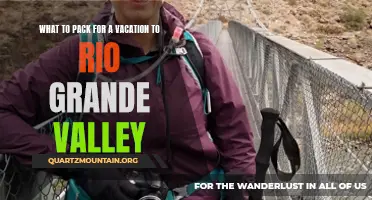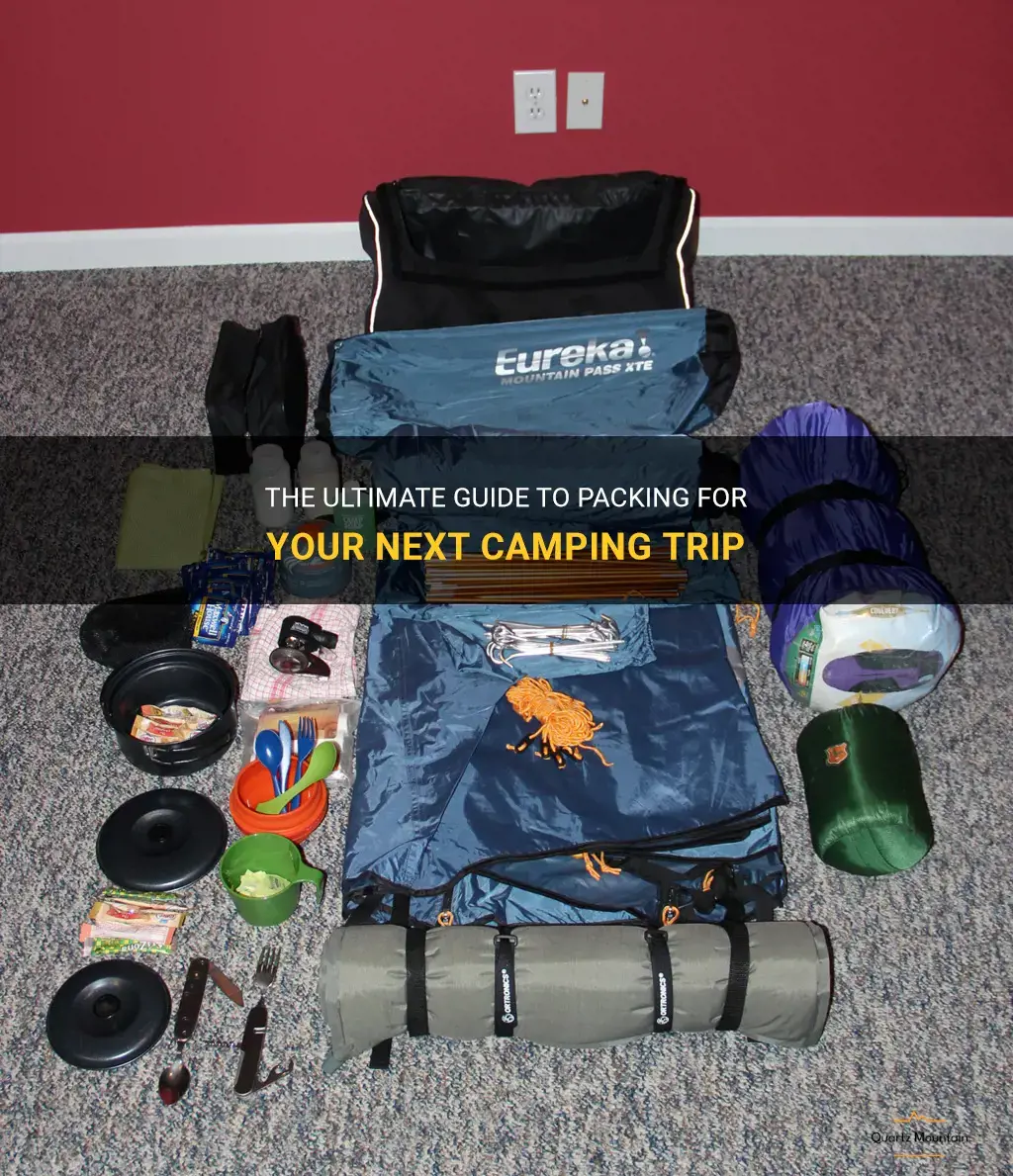
Are you ready for your next camping adventure? Whether you're a seasoned camper or new to the great outdoors, packing for a camping trip can be a daunting task. With so many essentials to remember, it's easy to feel overwhelmed. But fear not! The Ultimate Guide to Packing for Your Next Camping Trip is here to help you pack like a pro. From clothing and gear to food and safety supplies, we've got you covered. So grab your backpack and get ready to embark on your next adventure with confidence and ease.
| Characteristics | Values |
|---|---|
| Tent | Waterproof |
| Large enough for group | |
| Sleeping bag | Warm |
| Compact | |
| Backpack | Durable |
| Comfortable | |
| Cooking gear | Lightweight |
| Non-stick | |
| Portable | |
| Food and Water | Non-perishable |
| Easy to prepare | |
| Sufficient supply | |
| Clothing | Suitable for weather |
| Layering options | |
| Durable | |
| First Aid Kit | Comprehensive |
| Essential medications | |
| Insect repellent | |
| Toiletries | Biodegradable |
| Travel-sized | |
| Sunscreen | |
| Maps and Navigation | Topographic maps |
| Compass or GPS | |
| Whistle or signal mirror | |
| Lighting | Headlamp or flashlight |
| Extra batteries | |
| Lantern for campsite | |
| Firestarter | Matches or lighter |
| Firewood or tinder | |
| Fire extinguisher | |
| Tools and Miscellaneous | Knife or multi-tool |
| Duct tape | |
| Rope or paracord | |
| Trash bags | |
| Entertainment | Playing cards |
| Books or magazines | |
| Outdoor games |
What You'll Learn
- What are the essential items to bring when camping?
- How should I pack my camping gear to maximize space?
- Are there any specific items I should bring depending on the type of camping (e.g. car camping vs. backpacking)?
- What are some tips for organizing and packing a backpack for a camping trip?
- Are there any non-essential but convenient items to consider bringing when camping?

What are the essential items to bring when camping?
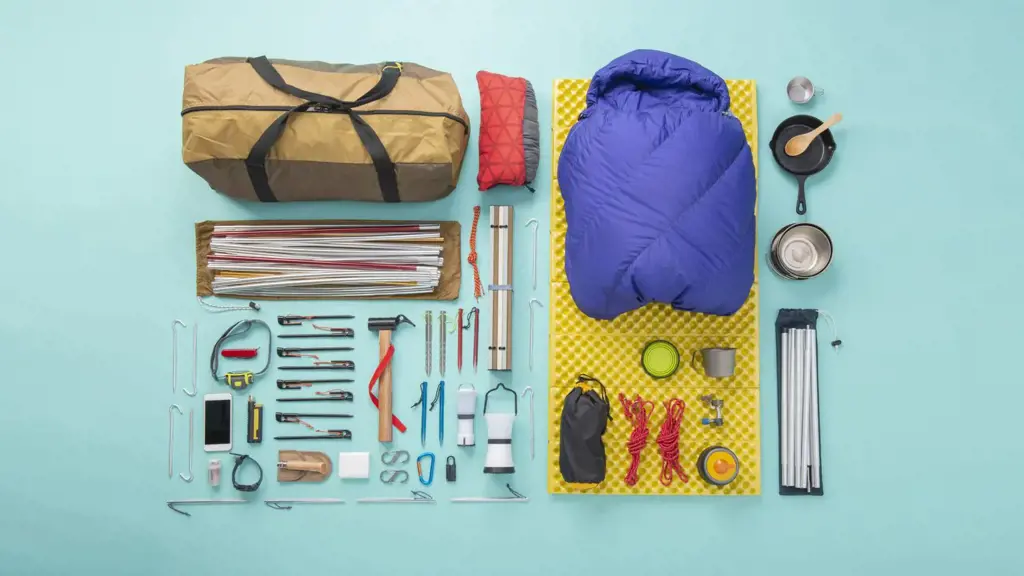
When planning a camping trip, it's important to bring along several essential items to ensure a safe and successful adventure. Camping requires a bit of preparation, and having the right gear and supplies can make a big difference in your overall experience. Whether you are a seasoned camper or new to the outdoors, here are some essential items to consider bringing on your next camping trip.
- Shelter: The most crucial item to bring is a reliable tent. Look for a tent that is spacious enough to accommodate you and your camping companions comfortably. Consider the weather conditions you may encounter and choose a tent that provides proper insulation and protection. Additionally, don't forget to pack a tarp or groundsheet to place under your tent to prevent moisture from seeping in.
- Sleeping Gear: For a comfortable night's sleep, bring a sleeping bag appropriate for the temperature you'll be camping in. Choose a sleeping bag with the right insulation and warmth rating. Additionally, investing in a sleeping pad or air mattress can greatly enhance your sleeping experience by providing a cushioned and insulated barrier between you and the cold ground.
- Cooking Gear: A camping stove or grill is essential for preparing meals in the great outdoors. Look for a portable stove that is suitable for backpacking or car camping, depending on your needs. Don't forget to pack a set of cookware, including a pot, pan, utensils, and plates. Bringing a cooler to store perishable food items and drinks is also recommended.
- Lighting: It's important to have a reliable source of light when camping, especially during the nighttime. Pack a headlamp or flashlight to navigate around the campsite, set up your tent, and find your way to the bathroom. Additionally, consider bringing some portable lanterns to provide a broader area of illumination.
- First Aid Kit: Accidents can happen even in the outdoors, so it's essential to have a well-equipped first aid kit. Pack items such as adhesive bandages, gauze pads, antiseptic wipes, tweezers, and any prescription medications you may need. Familiarize yourself with the items in the kit and their uses before your camping trip.
- Clothing and Personal Items: Pack appropriate clothing for the weather and activities you'll be engaging in. This includes items like hiking boots, rain gear, hats, sunglasses, and extra layers for warmth. Don't forget personal items such as sunscreen, insect repellent, toiletries, and a towel.
- Navigation: If you'll be exploring unfamiliar territory, it's essential to have navigational tools on hand. This can include a map of the area, a compass, and a GPS device or smartphone app for guidance. Make sure you are familiar with how to use these tools before relying on them in the outdoors.
- Fire Starter: Building a campfire is not only useful for warmth but also for cooking and creating a cozy atmosphere. Bring along waterproof matches, a lighter, or a fire starter kit to make the process easier. It's also important to check local regulations and obtain any necessary permits before starting a fire.
These are just a few of the essential items to pack when camping. The specifics may vary depending on factors such as the location, duration, and activities planned for your trip. It's important to plan ahead and make a checklist to ensure you don't forget any crucial items. By bringing the right gear and supplies, you can have a safe and enjoyable camping experience.
Packing Guide for a June Visit to Arches National Park: Essential Items to Bring
You may want to see also

How should I pack my camping gear to maximize space?
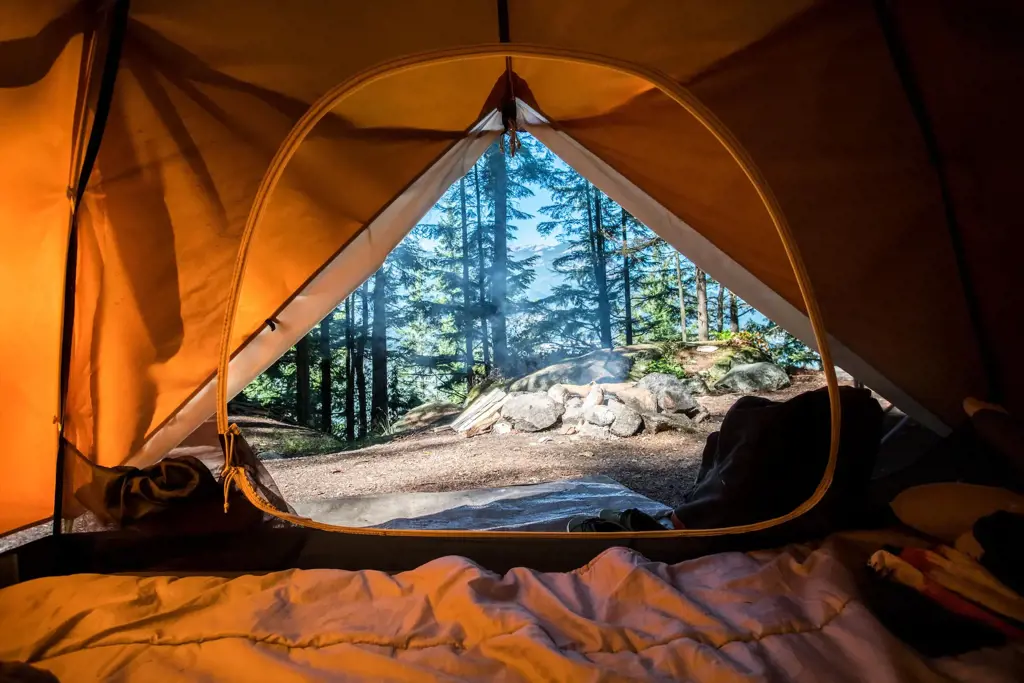
When it comes to camping, packing efficiently is key to maximizing space and making the most out of your outdoor adventure. Properly organizing and packing your camping gear can help you fit everything you need into a limited space and make your camping experience more enjoyable. Here are some tips on how to pack your camping gear to maximize space:
- Make a camping gear checklist: Before you start packing, make a checklist of all the essential items you will need for your camping trip. This will help you stay organized and ensure that you don't forget anything important. Divide your checklist into categories such as sleeping gear, cooking equipment, clothing, and miscellaneous items.
- Plan your packing strategy: Once you have your checklist, consider which items are bulky and which ones can be compressed or folded. Start by packing larger items that cannot be compressed, such as tents, sleeping bags, and camp chairs. These items should be placed at the bottom of your backpack or car trunk to form a solid foundation.
- Use compression bags and packing cubes: Compression bags and packing cubes are essential tools for maximizing space in your backpack or luggage. These items allow you to compress your clothing and other soft items, reducing their size and creating more room for other gear. Roll up your clothing tightly and place them in the compression bags or packing cubes, then squeeze out the air to make them as compact as possible.
- Utilize the dead spaces: Use every available space in your backpack or car trunk to maximize storage. For example, you can stuff small items like socks, underwear, or small cooking utensils inside shoes or your cooking pots. Fill in the gaps between larger items with these smaller items to make use of dead space.
- Organize your gear by function: Group similar items together to make it easier to locate and access them when needed. For example, keep all your cooking utensils and spices together in one bag or container. This will not only save space but also help you stay organized during your camping trip.
- Use multi-purpose gear: Invest in gear that can serve multiple purposes to minimize the number of items you need to pack. For example, consider a camping stove that can also function as a griddle or a backpack that can double as a pillow. These multi-purpose items will help you save space and reduce the weight of your pack.
- Minimize packaging and unnecessary items: Remove unnecessary packaging from food items and store them in reusable containers or zip-lock bags. This will not only save space but also reduce waste. Additionally, think critically about the items you are packing and consider if you truly need them. Avoid overpacking and bring only the essentials.
By following these packing tips, you will be able to maximize the space in your backpack or car trunk and have a more enjoyable camping experience. Remember to plan ahead and stay organized to ensure that you have all the necessary gear for your outdoor adventure. Happy camping!
Maximizing Value: What to Do If You Bought a Steam Two Pack
You may want to see also

Are there any specific items I should bring depending on the type of camping (e.g. car camping vs. backpacking)?
_20231212062125.webp)
When it comes to camping, there are a few key items that you should always bring regardless of the type of camping you're doing. These items include a tent, sleeping bag, cooking equipment, food, water, and appropriate clothing. However, depending on the type of camping you're doing, there may be some additional items that you should bring to ensure a safe and enjoyable experience.
Car Camping:
Car camping refers to camping at a designated campground where you can park your car nearby. Since you have the luxury of a car, you can bring heavier, bulkier items that wouldn't be practical for backpacking. Some additional items to consider bringing when car camping include:
- Camp chairs and a camping table: Car camping allows you to bring comfortable seating options and a table for dining or playing games.
- Cooler: Having a cooler filled with ice allows you to bring perishable food items and keep your drinks cold.
- Larger camping stove: Car camping typically allows for larger cooking equipment, so you can bring a bigger stove that accommodates larger pots and pans.
- Campfire cooking equipment: If campfires are allowed at the campground, you can bring items like a grill grate or tripod to cook over the fire.
Backpacking:
Backpacking involves carrying all your gear and supplies on your back as you hike through the wilderness to your camping destination. Since you'll be carrying everything, it's important to pack lightweight and compact items. Here are some additional items to consider bringing when backpacking:
- Lightweight, compact tent: Look for a backpacking-specific tent that is designed to be lightweight and easy to pack.
- Lightweight sleeping bag: Opt for a sleeping bag that is suitable for the expected temperatures and is compact enough to fit in your backpack.
- Portable camping stove: Look for a lightweight and compact camping stove that runs on fuel canisters for easy cooking.
- Lightweight cookware: Pack a small pot or pan that is lightweight and fits inside your backpack.
- Water filtration system: Depending on the availability of clean water sources, a water filtration system or purification tablets can be vital for backpacking trips.
- Durable backpack: Invest in a backpack that is comfortable to wear and can accommodate all your gear without straining your shoulders and back.
It's important to research and prepare accordingly for the type of camping you plan to do. Checking the specific campground regulations, weather forecasts, and trail conditions will help you determine what additional items to bring. Additionally, considering the duration of your trip, expected environmental conditions, and your personal needs will help you pack efficiently.
In conclusion, both car camping and backpacking require essential items like a tent, sleeping bag, cooking equipment, food, water, and appropriate clothing. However, there are specific items that you should bring depending on the type of camping. For car camping, additional items may include camp chairs, a camping table, a cooler, and larger cooking equipment. On the other hand, backpacking requires lightweight and compact items such as a lightweight tent, sleeping bag, portable camping stove, and a water filtration system. By considering these additional items, you can ensure a more comfortable and enjoyable camping experience.
Essential Items for a Cold Weather Vacation: Packing Guide
You may want to see also

What are some tips for organizing and packing a backpack for a camping trip?
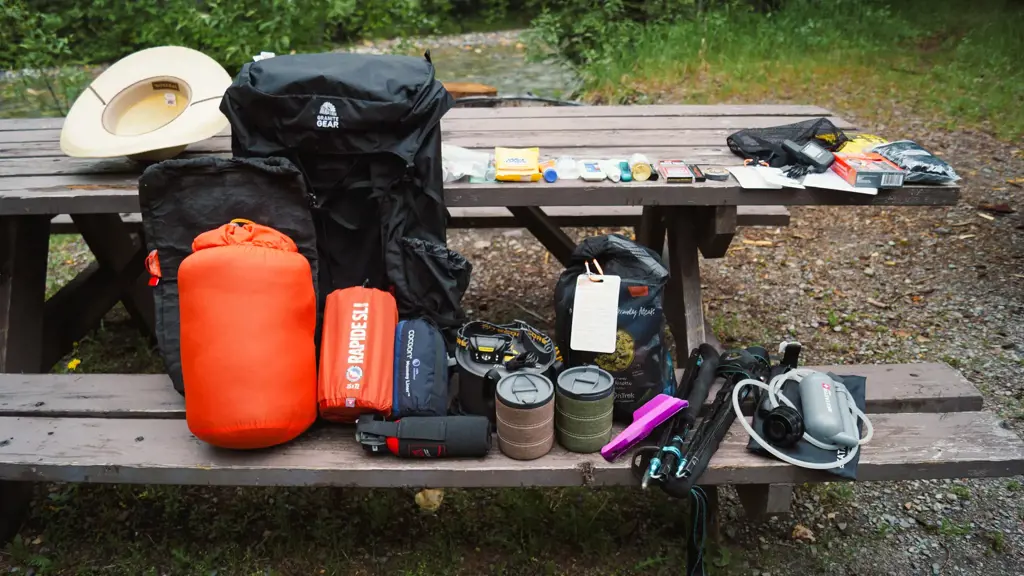
Camping trips can be a great way to enjoy the outdoors and disconnect from the hustle and bustle of everyday life. However, to ensure a successful camping experience, it's important to have a well-organized and properly packed backpack. Here are some tips to help you pack efficiently and effectively for your next camping adventure.
- Make a checklist: Before you start packing, it's helpful to create a checklist of all the essential items you will need. This can include items such as a tent, sleeping bag, cooking utensils, clothing, toiletries, and food. Having a checklist will help you stay organized and ensure that you don't forget anything important.
- Choose the right backpack: Selecting the right backpack is crucial for a successful camping trip. Look for a backpack with multiple compartments and adjustable straps for added comfort. Consider the size of the backpack as well, as it should be able to comfortably fit all of your gear without being too heavy or bulky.
- Pack strategically: When packing your backpack, it's important to pack strategically to ensure a balanced and well-distributed load. Start by placing heavier items closer to your back, such as your tent, sleeping bag, and cooking equipment. This will help to distribute the weight evenly and prevent strain on your shoulders and back. Place lighter items, such as clothing and toiletries, in the outer compartments of the backpack.
- Use packing cubes: Packing cubes can be a lifesaver when it comes to organizing your backpack. They help to keep your items neatly separated and make it easier to find what you need. Use different colored cubes to categorize your items, such as one for clothing, one for toiletries, and one for electronics. This will make it much easier to locate specific items when you need them.
- Pack multipurpose items: To save space and reduce the weight of your backpack, try to pack multipurpose items whenever possible. For example, choose a camping stove that can also be used to heat water for coffee or tea. Look for clothing that is versatile and can be layered for different weather conditions. This will help to minimize the amount of gear you need to carry without sacrificing functionality.
- Pack snacks strategically: Food is an important part of any camping trip, but it can also take up a significant amount of space in your backpack. To save space, opt for lightweight and compact snacks such as energy bars, trail mix, and dehydrated meals. Pack these items in easily accessible pockets or compartments so that you can easily grab them throughout the day.
- Don't forget the essentials: Finally, make sure to pack all of the essential items you will need for a safe and comfortable camping trip. This can include a first aid kit, insect repellent, sunscreen, a headlamp or flashlight, a map and compass, and a multi-tool or knife. These items may seem small, but they can be invaluable in emergency situations or for everyday tasks.
In conclusion, organizing and packing your backpack for a camping trip is a crucial step in ensuring a successful and enjoyable outdoor adventure. By following these tips, you can pack your backpack efficiently and effectively, allowing you to focus on the beauty and tranquility of nature. So get out there, embrace the great outdoors, and enjoy your camping experience to the fullest.
The Ultimate Hospital Bag Checklist: What to Pack for You and Your Newborn, Including Pampers
You may want to see also

Are there any non-essential but convenient items to consider bringing when camping?
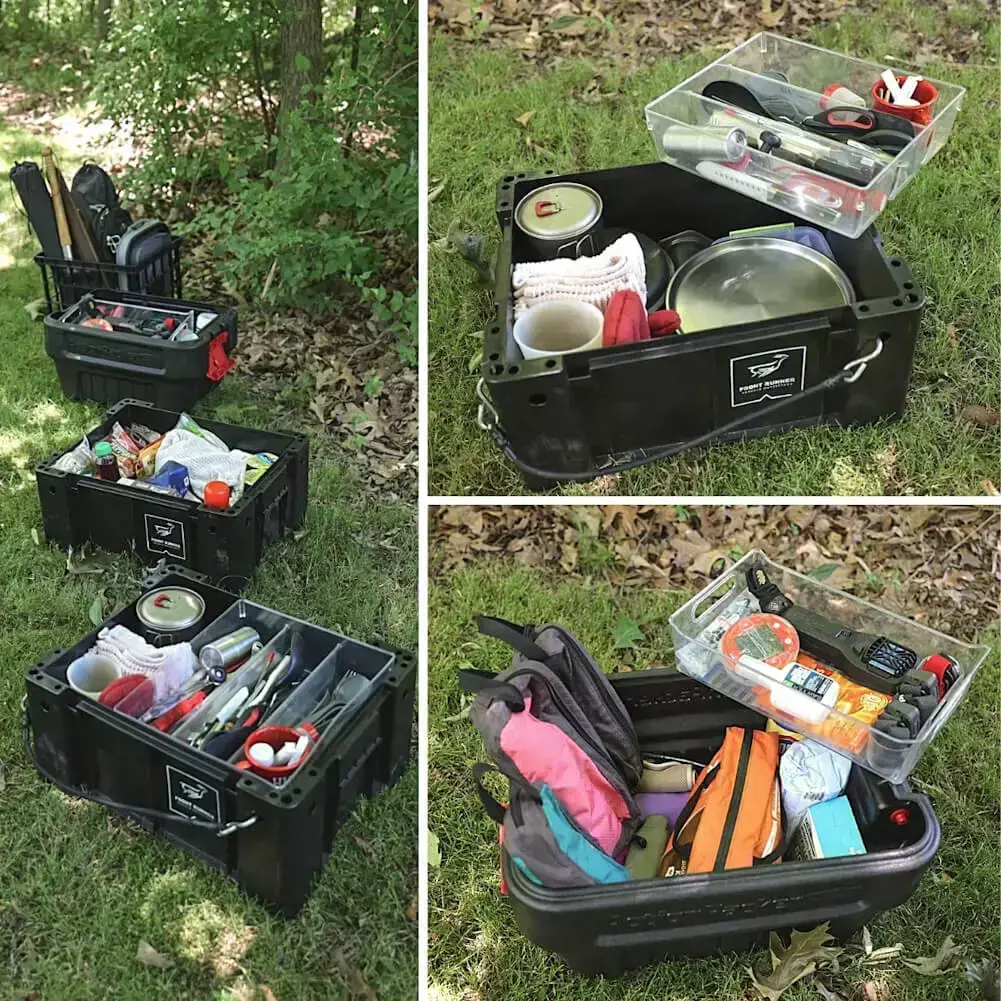
When it comes to camping, there are several non-essential but convenient items that can greatly enhance your overall experience. These items may not be crucial for survival, but they can make your time in the great outdoors more enjoyable and comfortable. Here are a few items to consider bringing on your next camping trip:
- Camping Chairs: While sitting on a log or a rock may suffice, having a comfortable camping chair can make a world of difference. Whether you're enjoying a meal around the campfire or simply relaxing and taking in the scenery, a sturdy and lightweight camping chair provides much-needed support and comfort.
- Portable Camping Hammock: Hanging a hammock between two trees is the epitome of relaxation. A lightweight and easy-to-use portable camping hammock can be set up in minutes and provides a cozy spot to kick back and relax. Plus, it takes up minimal space in your camping gear.
- Portable Shower: After a long day of hiking or other outdoor activities, there's nothing better than a refreshing shower. While it may not be an essential item, a portable camping shower can make you feel clean and rejuvenated. These showers often use solar energy to heat the water, making them eco-friendly and convenient.
- Campfire Grill: Cooking food over an open fire is a quintessential camping experience. While you can certainly cook on a makeshift grill or directly on the fire, a campfire grill is a convenient and efficient way to prepare meals. These grills typically have adjustable heights and can accommodate multiple cooking pots or pans.
- Portable Power Bank: In today's digital age, many people rely on their smartphones for various purposes, even while camping. A portable power bank can ensure that you have a reliable source of power to charge your devices when needed. It's always good to have a backup plan, especially if you're using your phone for navigation or emergency purposes.
- Portable Bluetooth Speaker: Music and camping go hand in hand. If you enjoy listening to your favorite tunes while sitting by the campfire or relaxing in your camping chair, a portable Bluetooth speaker is a convenient companion. Look for a speaker that is durable, waterproof, and has a long battery life to withstand the rugged camping conditions.
- Camping Pillow: Although you can use a rolled-up sweater or a makeshift pillow, having a dedicated camping pillow can greatly enhance your sleep quality. Camping pillows are designed to be lightweight, compressible, and comfortable. They provide much-needed neck and head support, ensuring you wake up feeling rested and ready for another day of adventures.
While these items may not be essential for your camping trip, they can certainly make your outdoor experience more convenient and enjoyable. Consider bringing along some of these non-essential but convenient items to enhance your comfort and relaxation while camping in the great outdoors. However, it's important to remember to respect nature and leave no trace behind by properly disposing of any waste and taking care of the environment. Happy camping!
Essential Items to Pack in Your Carry-On for a Cruise Adventure
You may want to see also
Frequently asked questions
When packing for a camping trip, it is important to remember the essentials. These include a tent with stakes and a rainfly, sleeping bags or blankets, a camping stove or firewood for cooking, food and snacks, a cooler with ice for drinks and perishable items, a flashlight or headlamp, extra batteries, a first aid kit, insect repellent, sunscreen, and camping chairs or a picnic blanket for sitting.
When packing clothing for a camping trip, it is important to consider the weather and activities you will be doing. It is usually a good idea to pack layers, as temperatures can vary throughout the day and night. Bring comfortable, moisture-wicking clothes for hiking and outdoor activities, including long-sleeve shirts and pants to protect against insects and the sun. Don't forget to bring extra socks, underwear, and a hat for protection against the sun.
One important tip for packing camping gear is to keep items organized and easily accessible. Use duffel bags or plastic storage bins with lids to store and transport gear, and label each container with its contents. Pack heavier items at the bottom of the bag or bin, and use packing cubes or stuff sacks to separate and compress clothing and smaller items. Don't forget to pack essentials like a camping knife, a multi-tool, and a waterproof tarp.
When planning meals for a camping trip, it is important to choose foods that are easy to store, prepare, and cook. Non-perishable items such as canned goods, granola bars, dried fruits, and nuts are good choices. Pack foods that are easy to cook over a campfire or on a camping stove, such as hot dogs, burgers, pasta, and foil-wrapped meals. Don't forget to bring a cooler with ice for perishable items like meat, dairy products, and fresh produce.
In addition to the essentials, there are a few other items that can enhance your camping experience. These include a camping hammock for relaxing, a portable camping shower or water filter, a portable camping toilet or shovel, rope or paracord for tying things down or hanging items, a compass or GPS device for navigation, a camera or smartphone for capturing memories, and camping games or cards for entertainment. Don't forget to bring any necessary permits or reservations for your chosen camping location.




